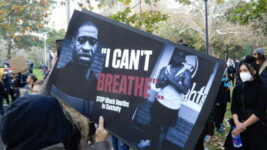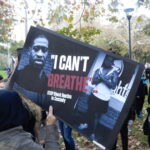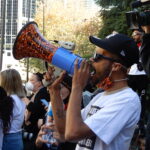Lawyers for George Floyd’s Killer Plead for Probation

Criminal defence lawyers for the police officer who killed George Floyd by kneeling on his neck for more than 9 minutes as he pleaded for breath have filed submissions to the effect that their client should be placed on probation, rather than sent to prison.
The filing has attracted the ire of Black Lives Matter advocates around the world, who marched in protest after Mr Floyd’s death.
Guilty of second degree murder
The fact a jury convicted officer Derek Chauvin of second and third-degree murder and second-degree manslaughter last month was considered a positive step forward for racial prejudice and police accountability in the United States.
Mr Floyd’s death led to changes to the rules surrounding choke holds and police accountability, and there has been hope the tragedy could lead to new standards in other countries, such as Australia where police officers are rarely prosecuted.
Here, George Floyd’s death has been likened to the killing of David Dungay Junior at the hands of prison guards in Sydney’s Long Bay Gaol on 29 December 2015.
Guards rushed his cell to stop him eating biscuits, dragged him to another cell, then held him face down and had him injected with a sedative.
Before losing consciousness, he told the guards 12 times that he could not breathe. He was due to be released on parole three weeks later. No one has ever been held responsible for his death.
Chauvin was part of a ‘broken system’
The former Minneapolis police officer is due to be sentenced later this month.
Despite the severity of his crime, Mr Chauvin’s defence team has filed submissions arguing their client should not be sent to prison, because he is just part of a ‘broken system’.
His lawyers have pled for a sentence of 65 days, the time their client has already served behind bars, followed by a period of probation.
Mr Chauvin currently in solitary confinement in a high-security prison because he could potentially be a target for other prisoners.
The motion argues that behind the politics, “Mr. Chauvin is still a human being and that before this incident occurred, he was an average man with a loving family and close friends. But that….”In the eyes of the public, he has been painted as a dangerous man.”
Prosecutors, on the other have, contend that Mr Chauvin’s actions were cruel, traumatized Mr. Floyd’s family, the bystanders who watched Mr. Floyd die, and the community. Prosecutors also stated that Mr Chauvin’s “conduct shocked the nation’s conscience.”
Prosecutors have asked for a prison sentence of 30 years.
Sentencing hearing
Derek Chauvin will be sentenced for the offence of second-degree murder, as it is the most serious charge for which he was convicted.
Minnesota sentencing guidelines suggest he is likely to receive a full term of 15 years behind bars, based on his lack of a prior criminal record.
However, the judge responsible for the sentencing, Peter Cahill, previously ruled that there were several “aggravating factors” in the case that would support a sentence above the range recommended by state guidelines. These factors include the abuse of his position of trust and authority.
During the trial, the court heard that even after George Floyd had no pulse, Chauvin remained in position until a paramedic waved him away so he could load the unconscious man on to a gurney.
Legal experts in the US say a request by the defence team for a lower sentence was expected, but is unlikely to succeed due to the severity of the crime.
Appeal underway
Mr Chauvin’s defence team has already filed an appeal against his conviction.
If the appellate court denies the appeal, the lower court’s decision will stand.
Additional charges against all officers
The three other officers involved in the death of George Floyd face charges of aiding and abetting murder. They are scheduled to be tried next year.
All four officers, including Derek Chauvin, also face additional charges of violating Floyd’s civil rights during the arrest.
In the meantime, the Justice in Policing Act of 2020, which aims “to hold law enforcement accountable for misconduct in court, improve transparency through data collection, and reform police training and policies,” is still in the process of being passed into law in the US.
However, the Minneapolis Police Department is being thoroughly investigated “to assess whether the Minneapolis Police Department engages in a pattern or practice of using excessive force, including during protests.”







